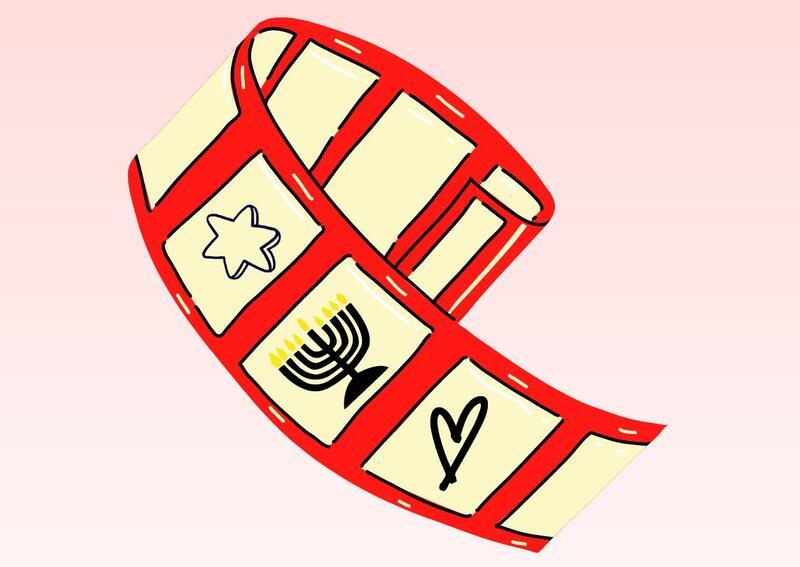Spiritual Jewish Representation on Film: Next Year’s Hanukkah Gift?
Sleepless on a plane ride in December, I turned to the screen in front of me, hoping to find something mildly entertaining to get me through the next hour and a half. As I scrolled through the “holiday movies” section, I was surprised to find a Hanukkah movie. Intrigued, I pressed play.
Eight Gifts of Hanukkah has the predictable romcom plot of many Hallmark holiday movies. Optometrist Sara, played by Israeli actress Inbar Levi, is searching for a new relationship after a breakup with her long-term boyfriend Paul. Unsurprisingly, this is not an easy endeavor for the newly single bachelorette. Through a dating app, she meets countless men for coffee, but none of them truly pique her interest. Just when she thinks she’s found “the one,” a patient of hers also asks her out on a date. Cue the first night of Hanukkah. Sara hosts a get together with her parents, brother, niece, and childhood family friend Daniel. At the end of the night, Sara finds a surprise on her doorstep: a bouquet of white roses and a note from a secret admirer.
As Sara continues to get to know both the man she met online, who turns out to be a famous chef, and her patient, who turns out to be a rich tech guru, the secret admirer’s gifts roll in each night. Along with her best friend Keisha, Sara attempts to find out which one of her suitors is sending her each heartfelt present. To the watcher, it’s painfully clear: Daniel, whom Sara has remained close with since childhood, is her admirer. With each night of Hanukkah, the gifts get increasingly personal, and Daniel becomes increasingly anxious to see if Sara will figure out that he is her admirer. The seventh gift is one that means the world to Sarah: a pair of glasses that look exactly like the ones her Bubbe used to wear. With this, Sara knows the gift must come from someone much closer to her than her new dates. Finally, after a cliché confession from Daniel, Sara realizes that she loves him back. On that same night, the eighth night of Hanukkah, Daniel proposes at the Mazal Ball.
Evidently, the underlying plot of this movie was not particularly original. The girl gets the guy. I was not particularly inspired by the story itself; however, I still found myself holding back tears while watching. I will admit that I do get easily emotional when watching movies or reading books, but this kind of Jewish representation was just so new to me. On the sixth night of Hanukkah, Sara receives a music box. When she opens it, the box begins playing Ma’oz Tzur. The song, whose title translates to “Rock of Ages,” discusses how God has helped Jewish people overcome adversity. This small moment in the film came as an unexpected surprise.
I was expecting the cheesy love story. I was expecting the cliché events like the “Mazal Ball” and the “Hanukkah Hunt.” I was expecting some dreidel games and maybe even a prayer. But when Ma’oz Tzur, a song that my dad used to sing to me when I was falling asleep as a child, appeared in the film, the tenderness of the moment mirrored my own Jewish experiences. I was surprised when I realized I was almost crying.
Reflecting on that moment, I realize why I was so deeply moved by this thirty second scene. For the first time, I felt like I could relate spiritually to a Jewish character portrayed in mainstream media. Like many of my Jewish peers, I appreciate any representation of our people in pop culture. However, I often feel that Jewish characters in popular American media are fundamentally flawed: they are too secularized, too Americanized. This version of Americanized Judaism is all I expected when watching Eight Gifts of Hanukkah. The pure existence of a Hanukkah movie is due to a vast Americanization of our religion and culture. The modern American celebration of Hanukkah formed in America’s post-World War II suburbs. Jewish parents felt that their children were in need of a Christmas-adjacent holiday to celebrate. Quickly, the holiday became commercialized alongside Christmas. In fact, Hallmark itself began printing cards for Hanukkah in the 1940s, and the company is now largely credited for the association of blue and white with the holiday.
While this Americanized Judaism has indeed been a part of my Jewish existence, Judaism, to me, is still about religious beliefs. Unless a plot-point specifically centers the spiritual beliefs of a Jewish character, for the most part, I have found that Judaism is often represented only culturally in American media. With Jewish holidays like Passover and Purim coming up, I’m holding out hope for better Jewish representation in the media. Yes, American Judaism can be bagels, dreidels, and Bar Mitzvah voice cracks, but it’s also diverse and spiritual. American Judaism is a culture, but it is still at its heart a religion with holy teachings and values. Hanukkah has become an important part of Jewish culture, but it’s also time for other holidays to be represented. Would a Purim spiel turned romcom be so unappealing? I pose this question because I do not yet know the answer. While I hope the answer is no, I know that each small moment of spiritual Jewish representation is a step in the right direction.
This piece was written as part of JWA’s Rising Voices Fellowship.







